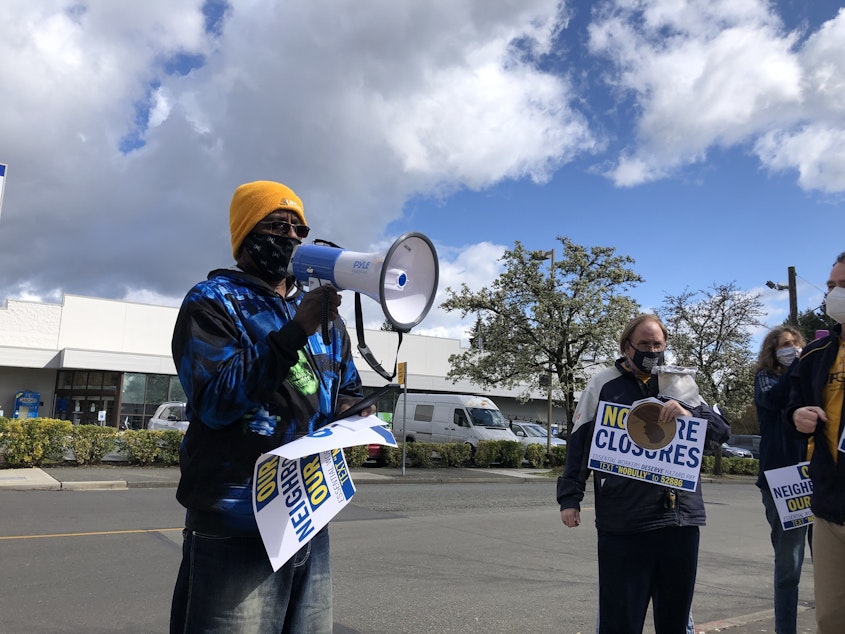QFC Employees call Seattle hazard pay a 'win' despite store closures

Bare shelves have appeared at two Seattle grocery stores slated for closure on April 24. QFC said it is closing the stores in part because of Seattle’s $4-an-hour “hazard pay” ordinance.
"Hey, hey QFC! Share your profits, stop the greed!” members of the United Food and Commercial Workers union shouted Thursday as they waved signs outside one of the closing stores, located in the Wedgwood neighborhood of northeast Seattle.
Stephanie Cook wasn’t there. She was getting her second Covid vaccine shot, and then working her last scheduled shift at the meat counter in the other QFC store that’s closing, on Capitol Hill.
Cook said instead of telling staff first, the company announced the store closures in February through the media. She saw the news on her way to work.
“I saw a link to an article on Twitter and I was like, wait, my store?” she said. She was the one to tell many of her colleagues.
QFC spokesperson Tiffany Sanders said in a statement that the company is now "meeting with each associate at the two affected stores to help them transition into a new position at one of our other locations if possible."
Cook said she doesn’t know where she’s going yet. But even with this stress, she said getting hazard pay during the pandemic has still been “a major win” and she has no regrets.
“It was the one time ever when I’ve worked in a retail job where I felt like we were important for society,” she said, adding that the extra pay allowed people to take more time off to reduce their risk of getting Covid.
Most grocers granted $2-an-hour hazard pay last April and May. Then this past February, Seattle mandated $4-an-hour hazard pay for frontline grocery workers for the duration of the pandemic.
QFC said Seattle’s ordinance increased operating costs at stores by an average of 22%, which was “financially unsustainable” at the two locations. QFC’s parent company Kroger is closing stores where hazard pay was enacted in California as well.
Sanders said QFC is hosting vaccination clinics for staff, and awarding $100 to every employee who receives it. She said, "We continue to believe that vaccinations — not extra pay — are the surest way to keep our stores safe for all who work and visit."
Margaret Cary came to Thursday’s protest outside the grocery store, where she said her son had a job bagging groceries when he was growing up. Cary said the decision reflects badly on QFC.
“It’s a loss both for having a local shop, but it’s also a loss for the relationships we’ve had with a lot of these folks who have worked here for years and years,” she said.
Employee Jeff Alexander said he’s worked for QFC for 17 years, four of them at this location. He will transfer to a store in Wallingford.
“We’re sad to see that the store’s closing after being here for twenty years,” he said.
While Cook said employees had speculated that the Capitol Hill store would close when the lease was up, employees at the Wedgwood store said the decision came out of the blue for them. That store had made changes and updates just in the past year.
Alexander said, “People see that they just remodeled the store — so they’re closing the store just so they don’t have to pay us.”




